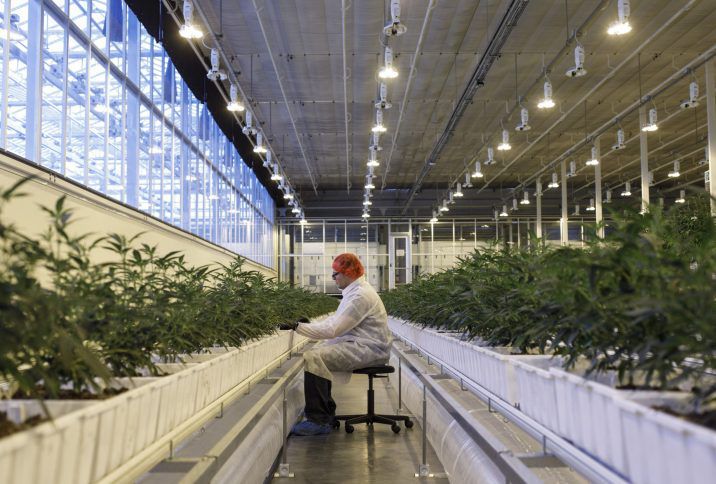You are here
Home 🌿 Recreational Marijuana News 🌿 Canadian government gets 'C' average in the legalization report card 🌿Canadian government gets 'C' average in the legalization report card

A new report from the Cannabis Council of Canada, which represents some of the country’s largest licensed producers, including Canopy Growth, Tilray, and Cronos Group, has graded the government’s performance over the first two years of legalization with a ‘C’ average.
Led by president and CEO George Smitherman, the former Minister of Health, the council seeks to be a national voice for producers, focusing on the development, growth, and integrity of the legal industry. The report card was informed by a national survey of 2,000 Canadians.
As part of that focus, the council has released a legalization report card, offering grades on 10 issues, including cannabis amnesty, medical patient access, and the efforts to combat the illicit market.
Support for cannabis legalization: B+
Public support for legalization has remained robust and consistent, the report says, with the percentage of Canadians who oppose the legal industry dropping modestly year-over-year to 24 per cent.
Keeping cannabis away from children and youth: B+
Citing Statistics Canada, the report states that cannabis use among 15- to 17-year-olds fell by nearly 10 per cent in the first year of legalization. Reducing youth access to cannabis was one of the core planks of the Cannabis Act.
Government leadership: B+
According to the council’s data, more than 40 per cent of Canadians support Canada taking on a larger position globally in promoting the industry. Less than a quarter of respondents expressed opposition to global market outreach.
Justice and law enforcement: B+
Roughly 85 per cent of Canadians have a strong awareness of the risks associated with driving under the influence of cannabis, according to the report, which notes that communities have broadly accepted, and worked within, the regulations of the Cannabis Act.
Jobs and the economy: C+
The cannabis industry has put down roots in communities across the country, revitalizing some small towns that had previously been reliant on resource-drive economies. While it hasn’t always gone as well as hoped, with some of the largest producers laying off hundreds of employees in the past year, sustained growth in the retail sector has helped offset job loss on the production side.
According to StatsCan just under 10,000 Canadians were working in the sector in 2019, a nearly 300 per cent increase from 2018, when roughly 2,600 Canadians were working in cannabis.
Consumer awareness: C
One of the challenges the industry has faced is finding a way to reach consumers under the restrictive marketing regulations of the Cannabis Act. Messages about product efficacy, attributes and composition remain difficult to communicate directly to consumers. More than 60 per cent of respondents said they support increased communication capabilities for license holders.
Combatting the illicit market: C-
According to the report, the legal market accounts for just over 50 per cent of all cannabis-related spending across Canada.
In Ontario, the latest quarterly report from the Ontario Cannabis Store indicated that roughly 25 per cent of the province’s cannabis consumers are acquiring products through legal channels. While there’s still a long way to go, that’s a significant increase from the last quarter of 2018, when that number was pegged at less than five per cent.

Medical patient access: D
Unlike other medicines, cannabis is subject to an excise tax, and many medical patients feel they are being pushed toward the unregulated markets in order to afford cannabis products. The report found that the vast majority of Canadians, 70 per cent, support adding medical cannabis products to private and public drug plans.
Cannabis amnesty: D
Roughly 70 per cent of Canadians support wiping criminal records for cannabis possession but less than three per cent of Canadians have successfully applied for the Cannabis Record Suspension Program.
The application process has been criticized for being overly cumbersome and the report states there is a need for a “marked change in approach.” Critics of the program have called on the government to automatically remove cannabis possession records.
Researcher, Development, and Innovation: D
Research into cannabis, while improving, is still difficult to conduct. Researchers have called on the government to expedite the issuance of research licenses to sustain Canada’s position as a global leader in cannabis research
420 Intel is Your Source for Marijuana News
420 Intel Canada is your leading news source for the Canadian cannabis industry. Get the latest updates on Canadian cannabis stocks and developments on how Canada continues to be a major player in the worldwide recreational and medical cannabis industry.
420 Intel Canada is the Canadian Industry news outlet that will keep you updated on how these Canadian developments in recreational and medical marijuana will impact the country and the world. Our commitment is to bring you the most important cannabis news stories from across Canada every day of the week.
Marijuana industry news is a constant endeavor with new developments each day. For marijuana news across the True North, 420 Intel Canada promises to bring you quality, Canadian, cannabis industry news.
You can get 420 Intel news delivered directly to your inbox by signing up for our daily marijuana news, ensuring you’re always kept up to date on the ever-changing cannabis industry. To stay even better informed about marijuana legalization news follow us on Twitter, Facebook and LinkedIn.




